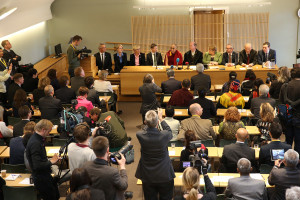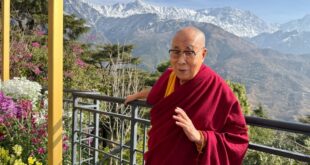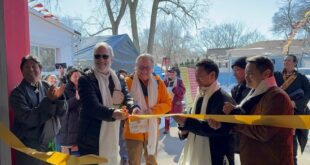By Rick Gladstone and Henrik Pryser Libell
The New York Times
May 10, 2014
The Dalai Lama, Tibet’s spiritual leader in exile, on Friday called for an outside inquiry into the self-immolations of more than 130 Tibetans in anti-China demonstrations over the past five years, and he suggested that in some cases, such acts of protest were understandable and not entirely wrong.
If compassion is the reason driving those who immolate themselves, the Dalai Lama said, they should be viewed differently from those motivated by anger. The religious issues surrounding the self-immolations, he said, “are very, very complicated.”
The remarks by the Dalai Lama, 78, a soft-spoken Buddhist theologian, were ambiguous compared with his previous criticisms of self-immolations, carried out mainly by Tibetan Buddhist monks frustrated with what they view as China’s repressive policies toward Tibet’s culture and religion.

The Dalai Lama made the remarks on the final day of a three-day visit to Norway, where he received the Nobel Peace Prize 25 years ago for his nonviolent philosophy in opposing China’s domination of his Himalayan homeland, which he fled in 1959.
China, which considers the Dalai Lama a subversive separatist, has accused him and his loyalists in exile of fomenting the self-immolations, which have embarrassed the Chinese authorities despite government attempts to thwart them. The International Campaign for Tibet, an advocacy group, has chronicled at least 131 self-immolations since February 2009, mostly in Tibetan-populated areas of western China adjoining Tibet.
Norwegian lawmakers in Oslo, who were among the Dalai Lama’s hosts, met with him in Parliament, where he appeared at a forum on Friday and answered questions that included whether he had urged a halt to the self-immolations.
“This is a very sensitive issue,” the Dalai Lama said, speaking in English. He said the self-immolations were “very sad” and that such “drastic action” probably had little effect on the underlying issue of Chinese policy on Tibet.
The Dalai Lama also said outsiders, like his hosts in Parliament, should conduct their own fact-finding visit to determine the causes. “I think sometimes Chinese leaders also need these things, too,” he said, because they are not given accurate information by their subordinates.
There was no immediate reaction from Chinese officials, who have described the self-immolations as a form of terrorism.
Whether self-immolations are religiously wrong, the Dalai Lama said, “entirely depends on motivation.”
“If such a drastic action takes place with full anger, then negative,” he said. “But more compassionate, more calm mind, then sometimes maybe less negative.”
The Dalai Lama’s visit to Norway has drawn particular attention because senior Norwegian government leaders decided against meeting with him in deference to China.
The Norwegian prime minister, Erna Solberg, justified the decision on the grounds that Norway has been trying to improve relations with China, which has been angry at Norway ever since the Nobel Peace Prize committee gave the award to the Chinese dissident Liu Xiaobo in 2010. Ms. Solberg elaborated on the decision on Friday, telling the national broadcaster NRK that it was a “necessary sacrifice” to improve relations with China.
Surveys suggested that many Norwegians were critical of the official snub, viewing it as a cowardly capitulation that sacrificed human rights in favor of economics. Thousands of well-wishers turned out to greet the Dalai Lama when he arrived in Oslo on Wednesday.
China’s state-run news media have not reported on the Dalai Lama’s trip, but the Chinese Foreign Ministry acknowledged the Norwegian government’s decision to snub him. “China pays attention to the announcement by the Norwegian side,” a Foreign Ministry spokesman, Qin Gang, said on April 28.
–A version of this article appears in print on May 10, 2014, on page A10 of the New York edition with the headline: Dalai Lama Urges Outside Inquiry Into Spate of Self-Immolations Among Tibetans.




